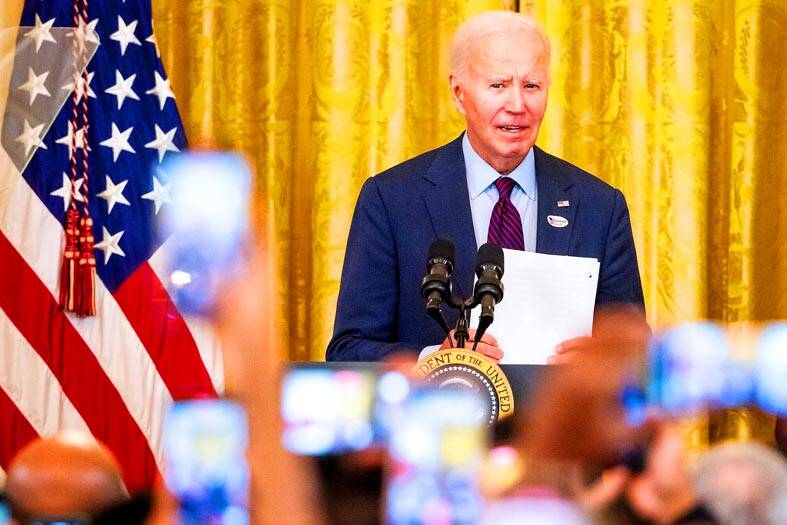US President Joe Biden’s administration is set to initiate a trade investigation into Chinese semiconductors in the coming days as part of a push to reduce reliance on a technology that US officials believe poses national security risks.
The probe could result in tariffs or other measures to restrict imports on older-model semiconductors and the products containing them, including medical devices, vehicles, smartphones and weaponry, people familiar with the matter said.
The investigation examining so-called foundational chips could take months to conclude, meaning that any reaction to the findings would be left to the discretion of US president-elect Donald Trump’s incoming team.

Photo: Bloomberg
Biden officials have for months debated whether to initiate the investigation under Section 301, which allows the US to impose restrictions on countries with unfair trade practices, the people said.
This week, White House officials agreed to move forward with the inquiry that could help protect the US chip industry.
Approving the probe now means that the new Trump administration would likely have the option to impose trade restrictions to protect domestic semiconductor production in the early months of the president-elect’s term.
Bolstering the US semiconductor industry has been a key focus for Biden, who has taken steps to limit advanced US technology from being exported to China.
Biden signed into law a bill that provided billions of dollars of incentives for chipmakers to build semiconductor factories in the US to stave off a need for cheaper Chinese-made chips.
Spokespeople for the US National Security Council and the US trade representative declined to comment.
The White House in the past two years has implemented export restrictions on advanced semiconductors made with US and allied technology, but in the meantime, China has manufactured the older, widely available types of semiconductors at a lower cost than its competitors.
Officials in the Biden administration worry that without restrictions, Beijing would flood the US and global markets with inexpensive chips, undercutting other companies and running them out of business.
In May, the White House announced that by next year it would increase tariffs on Chinese legacy semiconductors to 50 percent from 25 percent.
However, the Biden team largely agreed that was not enough to prevent a market disruption, especially as the US is looking to increase domestic production of semiconductors.
To impose those tariffs, Biden used the same authority Trump employed to levy more than US$300 billion in tariffs on Chinese goods during his first term.

The number of Taiwanese working in the US rose to a record high of 137,000 last year, driven largely by Taiwan Semiconductor Manufacturing Co’s (TSMC, 台積電) rapid overseas expansion, according to government data released yesterday. A total of 666,000 Taiwanese nationals were employed abroad last year, an increase of 45,000 from 2023 and the highest level since the COVID-19 pandemic, data from the Directorate-General of Budget, Accounting and Statistics (DGBAS) showed. Overseas employment had steadily increased between 2009 and 2019, peaking at 739,000, before plunging to 319,000 in 2021 amid US-China trade tensions, global supply chain shifts, reshoring by Taiwanese companies and

Shiina Ito has had fewer Chinese customers at her Tokyo jewelry shop since Beijing issued a travel warning in the wake of a diplomatic spat, but she said she was not concerned. A souring of Tokyo-Beijing relations this month, following remarks by Japanese Prime Minister Sanae Takaichi about Taiwan, has fueled concerns about the impact on the ritzy boutiques, noodle joints and hotels where holidaymakers spend their cash. However, businesses in Tokyo largely shrugged off any anxiety. “Since there are fewer Chinese customers, it’s become a bit easier for Japanese shoppers to visit, so our sales haven’t really dropped,” Ito

Taiwan Semiconductor Manufacturing Co (TSMC, 台積電) received about NT$147 billion (US$4.71 billion) in subsidies from the US, Japanese, German and Chinese governments over the past two years for its global expansion. Financial data compiled by the world’s largest contract chipmaker showed the company secured NT$4.77 billion in subsidies from the governments in the third quarter, bringing the total for the first three quarters of the year to about NT$71.9 billion. Along with the NT$75.16 billion in financial aid TSMC received last year, the chipmaker obtained NT$147 billion in subsidies in almost two years, the data showed. The subsidies received by its subsidiaries —

OUTLOOK: Pat Gelsinger said he did not expect the heavy AI infrastructure investments by the major cloud service providers to cause an AI bubble to burst soon Building a resilient energy supply chain is crucial for Taiwan to develop artificial intelligence (AI) technology and grow its economy, former Intel Corp chief executive officer Pat Gelsinger said yesterday. Gelsinger, now a general partner at the US venture capital firm Playground Global LLC, was asked at a news conference in Taipei about his views on Taiwan’s hardware development and growing concern over an AI bubble. “Today, the greatest issue in Taiwan isn’t even in the software or in architecture. It is energy,” Gelsinger said. “You are not in the position to have a resilient energy supply chain, and that,